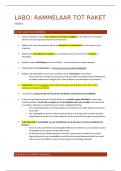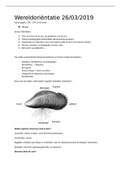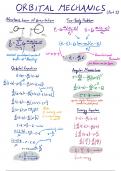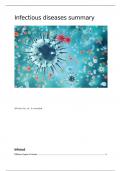Package deal
AQA GCSE Chemistry Bundle Solution Guaranteed Success
AQA GCSE Chemistry Bundle Solution Guaranteed Success
[Show more]AQA GCSE Chemistry Bundle Solution Guaranteed Success
[Show more]Chemistry IGCSE Revision Already Graded A+ Ionic Bonding ️Between a metal and a non-metal 1) soluble in water - polar water molecules are attracted to the giant 3D crystal lattice and break it apart 2) conduct electricity when molten - when molten, the bonds have broken and the electrons are...
Preview 3 out of 18 pages
Add to cartChemistry IGCSE Revision Already Graded A+ Ionic Bonding ️Between a metal and a non-metal 1) soluble in water - polar water molecules are attracted to the giant 3D crystal lattice and break it apart 2) conduct electricity when molten - when molten, the bonds have broken and the electrons are...
AQA GCSE Chemistry - Paper 1 Graded A+ 1. What is the charge carried by a proton? Is it positive or negative? Answer: +1 2. What is the charge of a neutron? Is it positive or negative? Answer: 0 3. What is the charge of an electron? Is it positive or negative? Answer: -1 4. What is the...
Preview 3 out of 27 pages
Add to cartAQA GCSE Chemistry - Paper 1 Graded A+ 1. What is the charge carried by a proton? Is it positive or negative? Answer: +1 2. What is the charge of a neutron? Is it positive or negative? Answer: 0 3. What is the charge of an electron? Is it positive or negative? Answer: -1 4. What is the...
AQA GCSE Chemistry - Paper 2 Verified Solutions 1. What is the formula for calculating the mean rate of reaction? Answer: Rate of reaction = Quantity of reactant used / Time taken 2. How do you calculate the mean rate of reaction using the product? Answer: Rate of reaction = Quantity of prod...
Preview 4 out of 36 pages
Add to cartAQA GCSE Chemistry - Paper 2 Verified Solutions 1. What is the formula for calculating the mean rate of reaction? Answer: Rate of reaction = Quantity of reactant used / Time taken 2. How do you calculate the mean rate of reaction using the product? Answer: Rate of reaction = Quantity of prod...
AQA GCSE chemistry C1 Verified Solutions 1. What is the central part of an atom called? Answer: The nucleus 2. What are the charges and relative masses of protons, electrons, and neutrons? Answer: Protons: +1, 1; Electrons: -1, 0.0005; Neutrons: 0, 1 3. Why are atoms neutral? Answer: Bec...
Preview 1 out of 3 pages
Add to cartAQA GCSE chemistry C1 Verified Solutions 1. What is the central part of an atom called? Answer: The nucleus 2. What are the charges and relative masses of protons, electrons, and neutrons? Answer: Protons: +1, 1; Electrons: -1, 0.0005; Neutrons: 0, 1 3. Why are atoms neutral? Answer: Bec...
AQA GCSE Chemistry Paper 1 (Triple) 1. What is the size of an atom's nucleus? Answer: Approximately 0.1 nanometers in diameter 2. Where is the nucleus located within an atom? Answer: At the center of the atom 3. What does the nucleus consist of? Answer: Protons and neutrons 4. What i...
Preview 3 out of 23 pages
Add to cartAQA GCSE Chemistry Paper 1 (Triple) 1. What is the size of an atom's nucleus? Answer: Approximately 0.1 nanometers in diameter 2. Where is the nucleus located within an atom? Answer: At the center of the atom 3. What does the nucleus consist of? Answer: Protons and neutrons 4. What i...
AQA GCSE Chemistry Paper 2 Verified Solutions 1. How can you measure the rate of a reaction? Answer: By measuring the quantity of reactant used or product formed over time 2. What is the formula for calculating the mean rate of reaction when measuring reactant quantity? Answer: Mean rate of ...
Preview 3 out of 26 pages
Add to cartAQA GCSE Chemistry Paper 2 Verified Solutions 1. How can you measure the rate of a reaction? Answer: By measuring the quantity of reactant used or product formed over time 2. What is the formula for calculating the mean rate of reaction when measuring reactant quantity? Answer: Mean rate of ...
Chemistry AQA GCSE C.10 - Using Resources Verified Answers 1. What is meant by a finite resource? Answer: A resource that is being depleted at a faster rate than it can be replenished, eventually leading to exhaustion. 2. Provide examples of finite resources. Answer: Metal ores, crude oil,...
Preview 2 out of 6 pages
Add to cartChemistry AQA GCSE C.10 - Using Resources Verified Answers 1. What is meant by a finite resource? Answer: A resource that is being depleted at a faster rate than it can be replenished, eventually leading to exhaustion. 2. Provide examples of finite resources. Answer: Metal ores, crude oil,...
AQA GCSE Chemistry - Quantitative Chemistry Already Graded A+ 1. What is Avogadro's constant? Answer: Avogadro's constant is the number of atoms, molecules, or ions in a mole of any substance, which is equal to 6.02 × 10^23 per mole. 2. How is concentration defined? Answer: Concentratio...
Preview 1 out of 3 pages
Add to cartAQA GCSE Chemistry - Quantitative Chemistry Already Graded A+ 1. What is Avogadro's constant? Answer: Avogadro's constant is the number of atoms, molecules, or ions in a mole of any substance, which is equal to 6.02 × 10^23 per mole. 2. How is concentration defined? Answer: Concentratio...
AQA GCSE Chemistry - C7 - Organic Chemistry 1. What is a hydrocarbon? Answer: A hydrocarbon is a compound that contains only hydrogen and carbon atoms. 2. What is the simplest type of hydrocarbon? Answer: Alkanes are the simplest type of hydrocarbon, characterized by having single bonds betw...
Preview 2 out of 5 pages
Add to cartAQA GCSE Chemistry - C7 - Organic Chemistry 1. What is a hydrocarbon? Answer: A hydrocarbon is a compound that contains only hydrogen and carbon atoms. 2. What is the simplest type of hydrocarbon? Answer: Alkanes are the simplest type of hydrocarbon, characterized by having single bonds betw...
AQA GCSE Chemistry Paper 1 Already Graded A+ 1. What is the smallest unit of an element? Answer: An atom is the smallest part of an element. 2. What is a substance that consists of only one type of atom? Answer: An element is a substance that contains only one type of atom. 3. What are the...
Preview 4 out of 35 pages
Add to cartAQA GCSE Chemistry Paper 1 Already Graded A+ 1. What is the smallest unit of an element? Answer: An atom is the smallest part of an element. 2. What is a substance that consists of only one type of atom? Answer: An element is a substance that contains only one type of atom. 3. What are the...
AQA GCSE Chemistry Unit C2 Verified Solutions 1. What is the positively charged particle found in the nucleus of an atom? Answer: Protons are positively charged particles that reside in the nucleus of an atom. 2. What is a subatomic particle with no electric charge? Answer: Neutrons are suba...
Preview 2 out of 5 pages
Add to cartAQA GCSE Chemistry Unit C2 Verified Solutions 1. What is the positively charged particle found in the nucleus of an atom? Answer: Protons are positively charged particles that reside in the nucleus of an atom. 2. What is a subatomic particle with no electric charge? Answer: Neutrons are suba...
AQA GCSE Chemistry - C5 Already Rated A+ 1. What is a list of elements ordered by their reactivity? Answer: The reactivity series is a list of elements in order of their reactivity. 2. What type of reaction occurs when a more reactive element replaces a less reactive one? Answer: Displacemen...
Preview 1 out of 4 pages
Add to cartAQA GCSE Chemistry - C5 Already Rated A+ 1. What is a list of elements ordered by their reactivity? Answer: The reactivity series is a list of elements in order of their reactivity. 2. What type of reaction occurs when a more reactive element replaces a less reactive one? Answer: Displacemen...
AQA GCSE Chemistry Topic 2- The Periodic Table Verified Answers 1. What is the systematic organization of elements in the periodic table called? Answer: The periodic table is a systematic organization of elements, known as the periodic table, due to its regularly repeating patterns. 2. Who w...
Preview 1 out of 4 pages
Add to cartAQA GCSE Chemistry Topic 2- The Periodic Table Verified Answers 1. What is the systematic organization of elements in the periodic table called? Answer: The periodic table is a systematic organization of elements, known as the periodic table, due to its regularly repeating patterns. 2. Who w...
AQA GCSE Chemistry – Electrolysis Verified Solution 1. What is the systematic organization of elements in the periodic table called? Answer: The periodic table is a systematic organization of elements, known as the periodic table, due to its regularly repeating patterns. 2. Who was the sci...
Preview 2 out of 8 pages
Add to cartAQA GCSE Chemistry – Electrolysis Verified Solution 1. What is the systematic organization of elements in the periodic table called? Answer: The periodic table is a systematic organization of elements, known as the periodic table, due to its regularly repeating patterns. 2. Who was the sci...
AQA GCSE Chemistry Paper 1 Already Rated A+ 1. What is the fundamental building block of an element? Answer: An atom is the smallest part of an element that can exist. 2. What defines an element, and how is it represented? Answer: An element is a substance made up of one type of atom, and it...
Preview 4 out of 32 pages
Add to cartAQA GCSE Chemistry Paper 1 Already Rated A+ 1. What is the fundamental building block of an element? Answer: An atom is the smallest part of an element that can exist. 2. What defines an element, and how is it represented? Answer: An element is a substance made up of one type of atom, and it...
AQA GCSE Chemistry Topic 1- Atomic Structure Complete Answers atom the smallest unit of matter Here are the rewritten questions in a different structure and with some paraphrasing: 1. What is the fundamental building block of an element, and what does it consist of? Answer: An element is c...
Preview 2 out of 5 pages
Add to cartAQA GCSE Chemistry Topic 1- Atomic Structure Complete Answers atom the smallest unit of matter Here are the rewritten questions in a different structure and with some paraphrasing: 1. What is the fundamental building block of an element, and what does it consist of? Answer: An element is c...
AQA GCSE 9-1 higher combined science - chemistry paper 2 All Answers Correct 1. How do we measure the speed of a chemical reaction? Answer: We measure the rate of reaction by calculating the quantity of reactant used up or product formed over a specific period of time. 2. What is the typic...
Preview 2 out of 10 pages
Add to cartAQA GCSE 9-1 higher combined science - chemistry paper 2 All Answers Correct 1. How do we measure the speed of a chemical reaction? Answer: We measure the rate of reaction by calculating the quantity of reactant used up or product formed over a specific period of time. 2. What is the typic...
AQA GCSE Chemistry - History of the Atom 1. What is the term used to describe the number of protons present in an atom? Answer: The atomic number. 2. What is the number of electrons in an atom related to? Answer: The number of protons. 3. How do you calculate the number of neutrons in an a...
Preview 1 out of 2 pages
Add to cartAQA GCSE Chemistry - History of the Atom 1. What is the term used to describe the number of protons present in an atom? Answer: The atomic number. 2. What is the number of electrons in an atom related to? Answer: The number of protons. 3. How do you calculate the number of neutrons in an a...
Chemistry Paper 2 GCSE AQA Foundation Verified Solutions 1. What is the state of balance reached when a chemical reaction and its reverse reaction occur at the same rate? Answer: Equilibrium. 2. What is a substance that speeds up a chemical reaction without being consumed or altered? Answe...
Preview 1 out of 4 pages
Add to cartChemistry Paper 2 GCSE AQA Foundation Verified Solutions 1. What is the state of balance reached when a chemical reaction and its reverse reaction occur at the same rate? Answer: Equilibrium. 2. What is a substance that speeds up a chemical reaction without being consumed or altered? Answe...
AQA GCSE Chemistry - Crude Oil Already Rated A+ 1. What is crude oil, and what does it consist of? Answer: Crude oil is a mixture of a very large number of compounds, primarily consisting of hydrocarbons. 2. What is a characteristic of a mixture? Answer: A mixture contains two or more elem...
Preview 1 out of 4 pages
Add to cartAQA GCSE Chemistry - Crude Oil Already Rated A+ 1. What is crude oil, and what does it consist of? Answer: Crude oil is a mixture of a very large number of compounds, primarily consisting of hydrocarbons. 2. What is a characteristic of a mixture? Answer: A mixture contains two or more elem...
AQA GCSE CHEMISTRY KEY WORDS VERIFIED ANSWERS 1. What type of solution has a pH level that is low due to the presence of hydrogen ions? Answer: Acid. 2. What is the energy required to start a chemical reaction? Answer: Activation energy. 3. What type of solution has a pH level that is high...
Preview 2 out of 9 pages
Add to cartAQA GCSE CHEMISTRY KEY WORDS VERIFIED ANSWERS 1. What type of solution has a pH level that is low due to the presence of hydrogen ions? Answer: Acid. 2. What is the energy required to start a chemical reaction? Answer: Activation energy. 3. What type of solution has a pH level that is high...
AQA GCSE Chemistry - 1.3 Separating Mixtures Guaranteed Success 1. What type of substance is made up of two or more components that are not chemically combined? Answer: Mixture. 2. What are three key characteristics of compounds? Answer: Compounds have a fixed composition, can only be separa...
Preview 1 out of 2 pages
Add to cartAQA GCSE Chemistry - 1.3 Separating Mixtures Guaranteed Success 1. What type of substance is made up of two or more components that are not chemically combined? Answer: Mixture. 2. What are three key characteristics of compounds? Answer: Compounds have a fixed composition, can only be separa...
AQA GCSE Combined Science Trilogy - Chemistry - Paper 2 1. What is a substance that is composed of only one element, compound, or substance not mixed with another substance? Answer: Pure substance. 2. How can mixtures be separated? Answer: Physical processes such as filtration, simple dist...
Preview 3 out of 28 pages
Add to cartAQA GCSE Combined Science Trilogy - Chemistry - Paper 2 1. What is a substance that is composed of only one element, compound, or substance not mixed with another substance? Answer: Pure substance. 2. How can mixtures be separated? Answer: Physical processes such as filtration, simple dist...
AQA GCSE Chemistry Topic 1 Verified Answers 1. What is the smallest unit of an element that can exist on its own? Answer: Atom. 2. What is a chemical bond between two or more elements? Answer: Compound. 3. What is a combination of two or more elements or compounds that are not chemically b...
Preview 2 out of 8 pages
Add to cartAQA GCSE Chemistry Topic 1 Verified Answers 1. What is the smallest unit of an element that can exist on its own? Answer: Atom. 2. What is a chemical bond between two or more elements? Answer: Compound. 3. What is a combination of two or more elements or compounds that are not chemically b...
AQA GCSE Combined Science Chemistry - Paper 2 Already Graded A+ 1. What is the rate of a chemical reaction? Answer: The rate of a chemical reaction is the speed at which reactants are converted into products. 2. What are some examples of chemical reactions with different rates? Answer: Examp...
Preview 2 out of 15 pages
Add to cartAQA GCSE Combined Science Chemistry - Paper 2 Already Graded A+ 1. What is the rate of a chemical reaction? Answer: The rate of a chemical reaction is the speed at which reactants are converted into products. 2. What are some examples of chemical reactions with different rates? Answer: Examp...
AQA GCSE Chemistry C8 Already Rated A+ 1. What is the concept of reaction rate, and why is it important? Answer: Reaction rate refers to the speed at which reactants convert into products. This concept is crucial in the chemical industry and our bodies, as it affects the efficiency and cost of...
Preview 2 out of 5 pages
Add to cartAQA GCSE Chemistry C8 Already Rated A+ 1. What is the concept of reaction rate, and why is it important? Answer: Reaction rate refers to the speed at which reactants convert into products. This concept is crucial in the chemical industry and our bodies, as it affects the efficiency and cost of...
AQA GCSE CHEMISTRY (9-1) GUARANTEED SUCCESS 1. What is the fundamental building block of matter, and what are its characteristics? Answer: Atoms are tiny particles that make up everything around us, with a radius of about 0.1 nanometers (1x10^-10 meters). They are incredibly small, with a 50p ...
Preview 1 out of 4 pages
Add to cartAQA GCSE CHEMISTRY (9-1) GUARANTEED SUCCESS 1. What is the fundamental building block of matter, and what are its characteristics? Answer: Atoms are tiny particles that make up everything around us, with a radius of about 0.1 nanometers (1x10^-10 meters). They are incredibly small, with a 50p ...
AQA GCSE Chemistry equations and formulas already rated A+ 1. How do you calculate the number of neutrons in an atom? Answer: You can calculate the number of neutrons by subtracting the atomic number from the mass number. 2. What is the relationship between atomic number and number of electr...
Preview 2 out of 10 pages
Add to cartAQA GCSE Chemistry equations and formulas already rated A+ 1. How do you calculate the number of neutrons in an atom? Answer: You can calculate the number of neutrons by subtracting the atomic number from the mass number. 2. What is the relationship between atomic number and number of electr...
AQA GCSE Chemistry Unit 1 Higher Verified Guide 1. What is the smallest unit of an element that can exist, composed of protons, neutrons, and electrons? Answer: The atom is the smallest unit of an element that can exist. 2. How do elements differ from compounds and mixtures? Answer: Elements...
Preview 1 out of 4 pages
Add to cartAQA GCSE Chemistry Unit 1 Higher Verified Guide 1. What is the smallest unit of an element that can exist, composed of protons, neutrons, and electrons? Answer: The atom is the smallest unit of an element that can exist. 2. How do elements differ from compounds and mixtures? Answer: Elements...
AQA GCSE Chemistry 4.6 - Rate and Extent of Chemical Change 1. How is the rate of a chemical reaction measured in terms of reactants? Answer: The rate of a chemical reaction can be measured by tracking how quickly the reactants are used up. 2. What is the relationship between the rate of a c...
Preview 2 out of 5 pages
Add to cartAQA GCSE Chemistry 4.6 - Rate and Extent of Chemical Change 1. How is the rate of a chemical reaction measured in terms of reactants? Answer: The rate of a chemical reaction can be measured by tracking how quickly the reactants are used up. 2. What is the relationship between the rate of a c...
AQA GCSE Chemistry - Atomic Structures All Answers Correct 1. What is the fundamental building block of all substances? Answer: Atoms. 2. What defines an element? Answer: An element is a substance composed of only one type of atom. 3. How many elements are recognized in the current scienti...
Preview 1 out of 3 pages
Add to cartAQA GCSE Chemistry - Atomic Structures All Answers Correct 1. What is the fundamental building block of all substances? Answer: Atoms. 2. What defines an element? Answer: An element is a substance composed of only one type of atom. 3. How many elements are recognized in the current scienti...

Stuvia customers have reviewed more than 700,000 summaries. This how you know that you are buying the best documents.

You can quickly pay through credit card for the summaries. There is no membership needed.

Your fellow students write the study notes themselves, which is why the documents are always reliable and up-to-date. This ensures you quickly get to the core!
You get a PDF, available immediately after your purchase. The purchased document is accessible anytime, anywhere and indefinitely through your profile.
Our satisfaction guarantee ensures that you always find a study document that suits you well. You fill out a form, and our customer service team takes care of the rest.
Stuvia is a marketplace, so you are not buying this document from us, but from seller bestscores1. Stuvia facilitates payment to the seller.
No, you only buy these notes for £18.49. You're not tied to anything after your purchase.
4.6 stars on Google & Trustpilot (+1000 reviews)
71872 documents were sold in the last 30 days
Founded in 2010, the go-to place to buy revision notes and other study material for 15 years now




